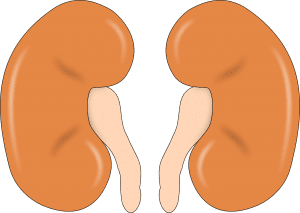Chronic Kidney Disease (CKD)
What is CKD?
Chronic kidney disease (also called chronic kidney failure or CKD) is defined as lasting damage to the kidneys that progressively gets worse over time. The kidneys filter wastes and excess fluids from your blood, excreted during urination. When chronic kidney disease reaches an advanced stage, dangerous levels of fluid, electrolytes and wastes can build up in your body and cause health complications. There are approximately 26 million American adults with CKD.What are the symptoms of CKD?
- Jaundice (yellowing of the skin)
- Stunted growth
- Vitamin deficiencies
- Enlarged liver or spleen
- Liver diseases
- Nausea
- Loss of appetite
- Fatigue and weakness
- Sleep issues
- Changes in how much you urinate
- Muscle twitches and cramps
- Swelling of feet and ankles
- Persistent itching
- Shortness of breath
- High blood pressure
What causes CKD?
Generally, CKD occurs when a disease or condition impairs kidney function, causing kidney damage to worsen over several months or years. These diseases and conditions include:- Type 1 or type 2 diabetes
- High blood pressure
- Glomerulonephritis, an inflammation of the kidney’s filtering units
- Interstitial nephritis, an inflammation of the kidney’s tubules and surrounding structures
- Polycystic kidney disease
- Prolonged obstruction of the urinary tract
- Vesicoureteral reflux, a condition that causes urine to back up into your kidneys
- Recurrent kidney infection, also called pyelonephritis
How is CKD diagnosed?
CKD is often diagnosed after clinical evaluation, detailed patient history, and identification of characteristic symptoms. A diagnosis may be confirmed through:- Blood test
- Urine test
- Imaging test
- Kidney tissue testing
What are the treatments for CKD?
Treatment for CKD generally involves controlling signs and symptoms, reducing complications, and slowing the progression of the disease. Some of these treatments include:- High blood pressure medications
- Cholesterol medication
- Anemia medication
- Diuretics
- Calcium, Vitamin D, and phosphate binder (to protect bones)
- Dialysis
- Kidney transplant
Where can I find out more about CKD?
Chronic Kidney Disease (CKD) Articles

Man with Pig Kidney Leaves Hospital, with All Signs Pointing to Success
Previously, Patient Worthy reported on research focused on the use of a pig kidney in a transplant operation involving a human patient. Richard (Rick) Slayman

Doctors Transplant Genetically Edited Pig Kidney Into 62-Year-Old Man with End-Stage Kidney Disease
Over 100,000 individuals living in the U.S. are on a waiting list for an organ transplant. An average of 17 people die each day while

March is National Kidney Month!
Editor’s Note: Chronic conditions and rare diseases don’t discriminate, Patient Worthy and its partners are interested in amplifying the voices of those from all identities

Had High BMI as a Child? Your Risk of Chronic Kidney Disease (CKD) in Adulthood May Be Heightened
Editor’s Note: Chronic conditions and rare diseases don’t discriminate, Patient Worthy and its partners are interested in amplifying the voices of those from all identities

Drug Combination Shows Promise in Chronic Kidney Disease
According to a story from drugs.com, a combination therapy for chronic kidney disease has shown considerable potential in a recent phase IIb clinical trial. The

Jardiance is Now FDA-Approved for Chronic Kidney Disease (CKD)
Previously, the FDA has approved Jardiance (empagliflozin) as a treatment option for adults with heart failure and to manage blood sugar in people ages

MRI Can Help with Earlier CKD Identification and Diagnosis
What do clinical evaluations, blood tests, urine tests, kidney tissue tests, and imaging tests all have in common? These are all diagnostic measures that doctors

UCI Study Suggests Relationship Between CKD and Stroke
In the past, doctors and researchers surmised that having chronic kidney disease (CKD) could increase the risk of having a stroke. Yet they didn’t know






